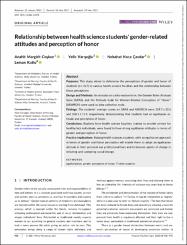Relationship between health science students' gender-related attitudes and perception of honor
Künye
Margirit Coşkun, A., Varışoğlu, Y., Koca Çavdar, N. ve Kutlu, L. (2022). Relationship between health science students' gender-related attitudes and perception of honor. Perspectives in Psychiatric Care, 58(3), 928-939. https://dx.doi.org/10.1111/ppc.12878Özet
Amaç: Bu çalışmanın amacı, çeşitli sağlık bilimleri fakültelerinde öğrenim gören öğrencilerin (n=427) cinsiyet ve namus algılarını ve bu algılar arasındaki ilişkiyi belirlemektir. Tasarım ve Yöntemler: Veri toplama aracı olarak tanıtıcı bilgi formu, Cinsiyet Rolleri Tutum Ölçeği (GRAS) ve Kadınlara İlişkin “Namus” Anlayışına İlişkin Tutum Ölçeği (ASWRCH) kullanılmıştır. Bulgular: Öğrencilerin GRAS ve ASWRCH ortalama puanlarının sırasıyla 159,7±23,1 ve 104,1±15,5 olması öğrencilerin eşitlikçi bir tutuma ve onur algısına sahip olduklarını göstermektedir. Sonuç: Sağlıklı/hasta bireylere hizmet vermek üzere eğitim gören sağlık bilimleri fakültesi öğrencilerinin cinsiyet ve namus algısı açısından güçlü eşitlikçi tutumlara sahip oldukları belirlendi. Uygulamaya Etkileri: Sağlık bilimleri öğrencilerinin cinsiyet ve namus algısı açısından eşitlikçi bir yaklaşımla yetiştirilmesi, onların kişisel ve mesleki yaşamlarında eşitlikçi bir tutum benimsemelerini, toplumsal değişimi başlatma ve sürdürmede değişimin aktörleri olmalarını sağlayacaktır. Purposes: This study aimed to determine the perceptions of gender and honor of students (n = 427) in various health science faculties and the relationship between those perceptions. Design and Methods: An introductory information form, the Gender Roles Attitude Scale (GRAS), and the Attitude Scale for Women-Related Conception of “Honor” (ASWRCH) were used as data collection tools. Findings: The students' average scores on GRAS and ASWRCH were 159.7 ± 23.1 and 104.1 ± 15.5, respectively, demonstrating that students had an egalitarian attitude and perception of honor. Conclusions: Students from health science faculties, trained to provide service for healthy/sick individuals, were found to have strong egalitarian attitudes in terms of gender and perception of honor. Practice Implications: Raising health sciences students, with an egalitarian approach in terms of gender and honor perception will enable them to adopt an egalitarian attitude in their personal and professional lives and to become agents of change in initiating and sustaining social change.

















